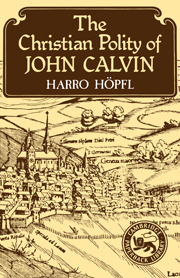Book contents
- Frontmatter
- Contents
- Preface
- Note on sources, orthography, notes and translations
- Introduction
- 1 The training of a lawgiver
- 2 The Institution: the first version
- 3 The first public ministry
- 4 Reconstruction
- 5 The Institution of 1543
- 6 Geneva and Calvin, 1541–64
- 7 The civil order of a Christian commonwealth
- 8 Political morality in the thought of Calvin
- 9 The laws and mores of a Christian commonwealth
- 10 Unfinished business: a speculative summary and postscript
- Appendix I Calvin's conversion
- Appendix II Predestination
- Notes
- Bibliography
- Index
- Cambridge Studies in the History and Theory of Politics
6 - Geneva and Calvin, 1541–64
Published online by Cambridge University Press: 24 October 2009
- Frontmatter
- Contents
- Preface
- Note on sources, orthography, notes and translations
- Introduction
- 1 The training of a lawgiver
- 2 The Institution: the first version
- 3 The first public ministry
- 4 Reconstruction
- 5 The Institution of 1543
- 6 Geneva and Calvin, 1541–64
- 7 The civil order of a Christian commonwealth
- 8 Political morality in the thought of Calvin
- 9 The laws and mores of a Christian commonwealth
- 10 Unfinished business: a speculative summary and postscript
- Appendix I Calvin's conversion
- Appendix II Predestination
- Notes
- Bibliography
- Index
- Cambridge Studies in the History and Theory of Politics
Summary
By the beginning of 1542 Calvin had formulated a rounded scheme of ecclesiastical polity, the digest of his pastoral experience at Geneva and Strasbourg as mediated by reflection upon Scripture and discussion with the leading evangelical theologians and organizers of his day; had buttressed it by scriptural legitimation; and had rendered it more or less coherent with the guiding themes of his theology (though here much remained to be done). But it is one thing to meditate a political scheme, another to have it received for law (and this had been accomplished by 20 November 1541, by which time all the Genevan Councils had accepted the draft), and yet another to transform scheme and law into a living reality – especially when the scheme was conspicuously vague at crucial points about the relations between a church as there outlined and the secular authorities, whose good-will and cooperation it required. More important, nothing specific had been said about what exactly these two potestates or regimines were actually to do, whether severally or in tandem. For the ends of both had so far only been set out in very general terms with little substantive content, and the same can be said about the character and conditions of their ‘cooperation’.
- Type
- Chapter
- Information
- The Christian Polity of John Calvin , pp. 128 - 151Publisher: Cambridge University PressPrint publication year: 1982

